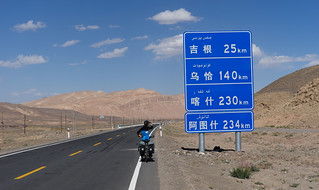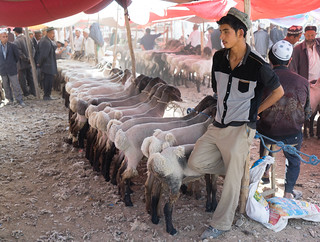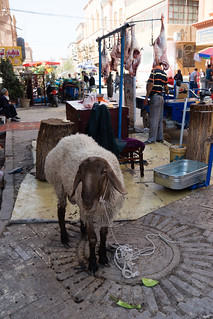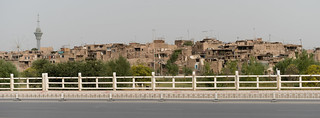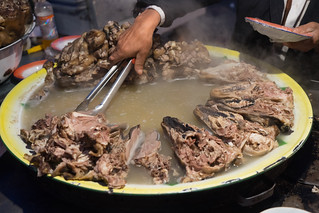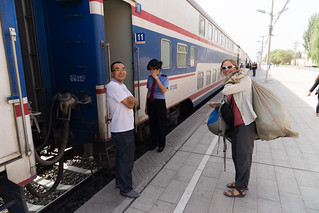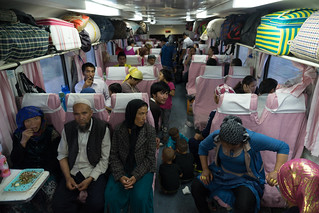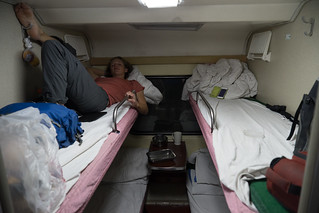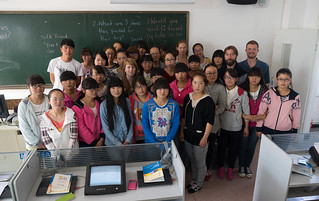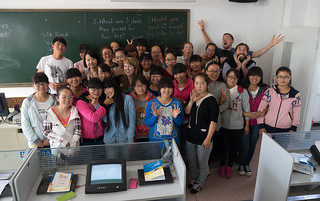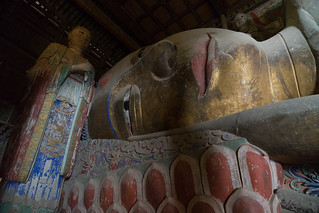We arrived in Kashgar in the early evening after our mandatory taxi ride between border posts. ‘Early evening’ is a confusing concept in far western China; the whole country, which is as wide east-to-west as the US, operates on Beijing time. So in early September, the sun doesn’t set in Kashgar until after 9:00 pm, and it doesn’t rise until after 8:00 am. We struggled to adjust to the time difference, but since parts of Xinjiang Province operate on their own informal time zone (two hours behind Beijing, the same as Kyrgyzstan and eastern Tajikistan), it didn’t matter too much.
We spent our first day recuperating and bingeing on internet and good food. After weeks in the sparsely populated Pamir Plateau, we were overwhelmed by all the people, commerce, and food. We had heard a rumor that train tickets were sold out for several days due to a mysterious Chinese holiday (later we were told that it was mid-autumn festival), so we didn’t rush to the station. We also hadn’t decided yet where to go. After one day of studying the map, we decided to take the train to Zhangye, in Gansu Province, and then bike over the Qilian Mountains to Xining on the northern edge of the Tibetan Plateau. Then we would bike another scenic (aka indirect) route to Lanzhou, staying on the Plateau as long as possible. However, when we made it to the station, we were told there were no tickets available for another five days. We quickly consulted our calendars and decided that we could make it work.
So we secured our tickets and set about visiting some Kashgar sites. First was the weekly animal market – I have never seen so many fat-tailed sheep in one place and frankly, it was a little disturbing. Some animals are slaughtered on site, and we watched a sheep being reduced to cuts of meat from a whole animal in minutes. Later, we saw the same procedure on our street – one animal would be hanging, in pieces, for people to buy, and a live sheep would be tied up nearby. When the last hunk of meat was sold, the waiting animal would be butchered on the spot. I had a lot of conflicting feelings about this – at home I rarely eat meat, for a lot of reasons. Here, I eat whatever people feed me, which often includes meat, for another tangle of reasons. On the one hand, I appreciate the apparent closeness between people and their animals. It isn’t sentimental, but somehow it seems slightly more humane to cut an animals’ throat by hand on the day it will get eaten – and probably within a few kilometers of the dinner table – than to round animals up and ship them off to anonymous slaughterhouses. I don’t know the environmental impacts of all the grazing we see, but I’m guessing it’s better for the animals, us, and possibly the land than factory farming. However, there is still suffering, and it still feels fundamentally wrong to kill another being just so I can eat it, when generally there are plenty of viable alternatives. In some of the places we’ve traveled, though, there really aren’t, and for herders, I imagine this is the most sensible and economical way to get their meals.
After the animal market, we visited the Sunday bazaar, and on the walk back we wandered through part of the old walled city. At first it appeared deserted, but after climbing some steps between the houses, we found a vibrant neighborhood, though it looks like it may be slated for destruction. There were weird big spotlights all around the walled area and it looked like a park was being developed nearby.
We went to the night market several times for dinner – you can just wander from stall to stall and have a little bit of everything: steamed dumplings, kebabs, goat’s head soup (we didn’t have it, but another person from the hostel tried it. He said it was delicious, but I can’t bring myself to eat a part of an animal that makes expressions; you’ve gotta draw the line somewhere…), noodles with chickpeas, hot pot, plov, and multiple servings of ice cream to put out the fire and feed our addiction, which had been neglected in the ‘stans. After our first night we observed that we’d just had more variety in one meal than we’d had in three weeks in the Pamirs. It’s not that the food there was bad, just simple, and sparse.
Partway through our time in Kashgar, I got sick and spent a couple of days lying in our hotel room. While it was a bummer not to feel well (especially with all the delicious food in the city), in some ways it was nice to have an excuse to do nothing. I Skyped with family and friends, caught up on the news (and Facebook), read books about China, and generally lazed around. The day before our scheduled departure, we took our bikes to the train station to be sent ahead as cargo, following the advice of other bike tourists and the hostel staff who said that this was standard protocol and that the bikes would arrive at the same time as we would, or even before.
Finally, it was time to leave Kashgar, and we took a taxi to the station. Boarding the train was a smooth process, and we quickly settled into our ‘hard sleeper’ bunks. One of the interesting things about the train was the ethnic distribution across the different seating classes. The hard sleeper class consists of four or six bunks to a compartment – quite comfortable, if a bit cramped. Most of the other people in the sleeper cars were Han Chinese (China’s ethnic majority), although the train was traveling through Xinjiang Province, which has a very large Uyghur population (one of China’s many ethnic minorities). While wandering around the train I eventually stumbled upon the ‘hard seat’ section, and it was a sudden explosion of color and sound – nearly all of the passengers in this class were Uyghur, and colorful headscarves, embroidered skullcaps, and friendly waves and smiles suddenly surrounded me. A group of men invited me to sit on the floor with them, and we had a stilted conversation in Turkik-ish.
In the middle of the night, the train stopped at a station and didn’t move for eight hours, which meant that we would miss our connecting train in Urumqi. David befriended a Chinese woman who spoke some English, and she walked us through the process of changing our tickets once we arrived in Urumqi, sometime after midnight on the second day. She also tried to help us find a hotel near the train station, but the one she showed us to refused to let us stay (there are strange rules about which hotels can accept foreigners). Since it was nearing 2:00 AM and our train left at 9:00 AM the next morning, we decided to just go with brand recognition and we struck out to the Super 8 that we could see across the freeway from the train station. However, the road system was so convoluted that we had to take a taxi there. The driver tried to convince us to let him take us to another place that was allegedly cheaper (but would require a higher taxi fare), but we refused since we had no idea where he wanted to take us. We soon regretted our decision, though, when the Super 8 was full (the girl sleeping on a cot behind the desk woke up for long enough to wave her hands in front of her face – a clear “no!”). A lap around the nearby hotels yielded the same results. At this point it was nearly 3:00 AM. Getting back to the knot of taxi drivers who had fought over us earlier in order to have them take us to the mysterious ‘cheaper’ place didn’t really appeal, and at this point we wouldn’t get more than five hours of sleep wherever we went. So we did the logical thing, which was to take the elevator in the Super 8 up a few floors until we found a nice carpeted alcove. There, between the fire escape and a convenient door that hid us from the hallway, we bunked down for the remainder of the night. Despite a high-pitched beep emanating from above our heads every couple of minutes and a moment of panic when I heard voices and thought we’d be discovered, we slept quite well and were refreshed for the next leg of our train trip.
We finally arrived at our destination, Zhangye, a ‘small’ town of about one million in the Hexi Corridor (a narrow strip of land between mountain ranges where the Silk Road routes converge) shortly before midnight on the third day of travel. Our bikes were nowhere to be found, but we figured the cargo office just wasn’t open at that time and that we could get them the next day. Fortunately, we had lined up a place to stay with a Peace Corps volunteer, and soon we were comfortably bunked down in his spare room. The next day we ventured back to the train station where, after some charades, google translate, and finally a call to our Beijing Hero, Alvin (a friend of a friend who has helped us out a ton), we learned that the bikes had been sent with a different company and we needed to call a number or visit an address on the receipt. Our host, Raines, enlisted a student to call the number, and we were both devastated and relieved to learn that they had been sent past Zhangye to Lanzhou, the provincial capital, for ‘security inspection’ and that they would arrive two days later. We were relieved because at least they hadn’t been lost, but we were frustrated since the combination of train ticket availability and bike delay meant that we probably wouldn’t be able to make it to Mongolia in the time left on our multiple-entry visa (we have a year-long visa but we can only stay for 30 days at a time). We’re still figuring out how to handle that.
We made the best of our time, though – we had lots of tasty meals with Raines and Kelly, another volunteer, as well as some other teachers and students. We also visited their classes and gave a presentation on our trip, and saw the giant Buddha for which Zhangye is famous. It was a beautiful site and we enjoyed wandering the temple and the surrounding part of the city. Zhangye is a nice, manageable size and there is plenty of delicious food near the university, and with our excellent hosts we felt like we’d had a soft landing into central China. When the bikes finally arrived (three days or two hours behind schedule, depending on how you look at it), it was too late to start biking, so we enjoyed a last night with our fellow Americans – we watched Frozen and I baked ‘cookies’ with the odds and ends I could find in the supermarket (buckwheat oatmeal chocolate bar chunk cookies, anyone?) and Kelly’s baking supplies, which fortunately included baking soda and cinnamon – all you need, really.
The next morning we started our first real biking in China – stay tuned for a post on biking up and around the Tibetan Plateau in Qinghai Province!







